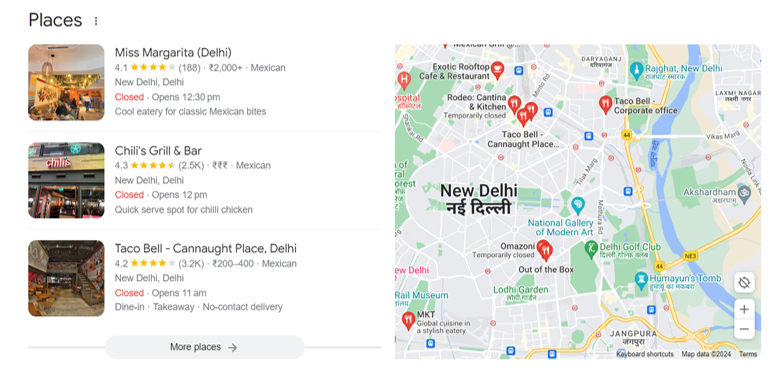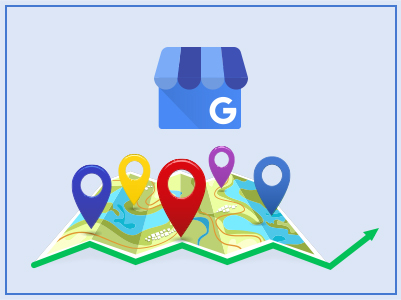Imagine customers easily finding you when they search for services in your area. In this blog, we’ll walk you through simple, practical tips to boost your visibility in local searches. From optimising your Google My Business listing to engaging with your community on social media, this guide covers everything you need. Let’s dive in and improve your local SEO.
Visibility in the local community is essential for any small business that aspires to flourish within its sector or community. Google displays local results in places like Maps and Search when users search for a company or location that is located in close proximity to them. For instance, searching for “Mexican restaurant near me” on your mobile device will most likely see local options suited to your preferences.
You run the risk of losing potential clients who are more than willing to employ your services if your company is not optimised for local search. In summary, local search engine optimisation is essential for ensuring your company remains relevant. This blog will cover the nuances associated with Local SEO, its know-how, and strategies to improve your virtual rankings.
Local Search Engine Optimisation (SEO) enhances a business’s online presence to boost visibility and Google search ranking in local search results. This strategy is vital for brick-and-mortar stores and service-based businesses, focusing on attracting nearby customers.
Here’s how it works: you optimise your website, create and manage your Google Business Profile, gather online reviews, and ensure your business details are consistent and accurate everywhere online. Doing this makes your business more likely to appear in local searches, attracting more people to visit your store or use your services. In short, Local Search Optimisation helps bring more local customers through your doors. Unlike traditional SEO, which targets broader audiences, local SEO aims to connect businesses with nearby customers searching for products or services.
Search engines utilise local search ranking parameters to decide how to display businesses in local search results. How effectively a business corresponds to a user’s search intent and location is affected by these criteria, which include prominence, distance, and relevancy.
Local Search Optimisation involves several key concepts and terms:
Here’s an example of three businesses that are optimised for the keyword “Mexican restaurant near Connaught Place Delhi.”
Google local pack results for “Mexican restaurant near Connaught Place Delhi” showcase how these businesses appear as standard search results and feature prominently on a map, making it convenient for potential customers to find their locations easily.
These results highlight crucial business information such as reviews and operating hours, giving users all the essential details.
Understanding the impact of Local Search Optimisation is crucial for businesses aiming to optimise their online presence and engage with local consumers. Here are the key benefits of this practice that contribute to the success and expansion of companies located in particular regions:
Understanding the impact of Local Search Optimisation is crucial for businesses aiming to optimise their online presence and engage with local consumers. Here are the key benefits of this practice that contribute to the success and expansion of companies located in particular regions:
Local SEO encompasses the optimisation and management of online reviews and ratings. Positive reviews contribute to the development of a robust online reputation and the cultivation of trust among potential consumers, thereby influencing their decisions and increasing the number of conversions.
The process of tailoring marketing strategies to concentrate on certain geographic regions through the use of local search engine optimisation is intended to facilitate targeted outreach to local consumers. This strategy guarantees that marketing resources are allocated effectively in order to reach the most relevant potential clients. As a result, promotional efficacy is maximised, and higher ranks are achieved in the results of local search queries. Because of this enhanced visibility, local audiences are able to readily locate your products and services online, which greatly increases organic traffic and brand awareness..
By adopting local SEO tactics, businesses can acquire a substantial advantage over their competitors, especially in highly competitive regional markets. Customers looking for items or services in the area are more likely to visit businesses that rank highly in local search results. Because of this boost in exposure, they can surpass rivals who still need to optimise for local search visibility.
Local search engine optimisation is an essential component in the process of luring prospective customers to traditional businesses. By optimising for local searches, businesses can tap into the intent of local consumers, driving more foot traffic and enhancing the chances for face-to-face interactions and sales. A study by comscore reveals that 78% of all local searches on mobile devices led to a direct purchase within 24 hours, of which 73% were done in a physical store.
Local SEO is frequently the more economical marketing tactic compared to larger-scale SEO campaigns. This helps companies to focus on reaching a specific demographic in their immediate area, which in turn helps them save money and get the most out of their advertising budgets. Because it concentrates on the most relevant and potentially profitable clients, this tailored strategy benefits small and medium-sized firms (SMEs) with limited marketing resources.
Discovering effective Strategies to Improve Local SEO can be transformative for your business, enhancing its visibility and attractiveness to potential customers within your community. Below are some strategies that will help you achieve these goals:
Google My Business has evolved into an essential cornerstone of local search strategies. With Google’s robust backing, stringent verification protocols, and active promotion of its content, Google My Business stands as a pivotal tool for businesses aiming to meet Google’s stringent standards and enhance their visibility in local search results.
To list and manage your Business Profile on Google, follow these steps:
Positive customer reviews can improve your Google My Business profile, improve your business’ search ranking, build local consumer trust, and increase sales. They act as social evidence of the quality of your company’s products/services and are essential for better local SEO in the long run.
Your Google search ranking and client base can both benefit from positive reviews and suffer from negative ones. Gaining your audience’s trust and loyalty is as simple as encouraging reviews and responding to criticism.
Here are effective strategies to encourage customer reviews:
Building local citations is an essential component of a local SEO strategy. Online mentions of your business on directories such as LinkedIn, Facebook, Google Business Profile, Yelp, Foursquare and other industry-specific or location-based directories are referred to as local citations. Improved Google search ranking or online search ranking results from consistent and accurate citations, which increase trust and credibility with search engines.
When Google recognises your business information across numerous reputable sources, it is more likely to include it in local search results, particularly if your Name, Address, and Phone Number (NAP) details are consistent.
The following are some recommendations for establishing local citations:
Numerous strategies that are effective for non-local websites can also be implemented by local businesses, including locksmiths, pizza shops, and dentists when it comes to local link development. However, local businesses possess a unique advantage: they are associated with a particular city or state, providing them with a plethora of distinctive backlink opportunities that non-local sites cannot exploit.
For instance, a restaurant in Delhi can build the authority of their website by working together with local food bloggers or by featuring themselves in city guides. Restaurants can feature themselves for backlinking through local directories, collaborations with influencers, guest post blogging, local event sponsorships, and active engagement on social media platforms.
This will bring local traffic that is specifically targeted to the business. Making thoughtful use of local relationships can significantly increase the search engine optimization efforts of a company – an advantage that the non-local competitors cannot make use of.
Building links to your website entails the acquisition of new links from external domains. In the eyes of Google, these hyperlinks, particularly those from sites with high domain authority, enhance your website’s authority. In search results, your online search ranking increases in tandem with your domain authority.
Get backlinks from credible local sites to construct a local link strategy. You can consider the following approaches:
Additionally, Google employs mobile-first indexing, meaning it primarily uses the mobile version of your website for indexing and Google search ranking. In simple words, Google uses mobile-first indexing to index and rank your website’s content in search engine results. Google recognizes the growing prominence of mobile devices in internet consumption. Thus, optimising your website for mobile devices is essential for user experience and Google result rankings.
The first step in creating a user-friendly website is to choose a responsive theme or template. These types of designs automatically adapt to different screen sizes. Also, ensure your website is easy to navigate on mobile devices. This involves having a clean and intuitive navigation menu, readable font sizes, and subtle advertisements.
The term “keyword” refers to a set of closely related words or phrases that describe a significant portion of your content.Their keywords can significantly affect a business’s capacity to generate local traffic and conversions. Therefore, Local Search Optimisation experts should thoroughly study their target audience’s search habits. You need to know what a local audience wants and needs to pick keywords that will work. Businesses can enhance their client’s ability to connect with the local community by integrating location-specific details. Whenever you create content, ensure it is optimised for search engines by incorporating high-volume keywords into the URL, title, header, meta description, and body.
Here’s how you can optimise keywords for local businesses:
With the ever-increasing popularity of voice search, Local Search Optimisation strategies must now consider how individuals phrase their requests when utilising speech-enabled devices. Unlike typed searches, voice queries tend to feature longer, more conversational keywords. So, it’s crucial to modify your SEO strategies to fit this conversational tone.
If you want your content strategy to be in sync with how people use search engines, you should include classic question formats or FAQs like “who,” “what,” “when,” “where,” “why,” and “how” in it. If you own a bakery in London, for instance, you may optimise your content for voice search by answering questions like “Where can I find the best cakes in London?” or “How do I order birthday cakes near me?” and similar ones. This approach enhances visibility for local searches, ensuring that users searching via voice assistants can easily discover and access your business.
Social media provides a great way to increase website visibility and drive traffic, which is crucial for successful SEO operations. The best social media organisations are masters in narrowing in on specific demographics and interests to provide them with highly personalised content.
Social media provides a direct path to engagement and conversions because its audience frequently reflects that of organisations’ target demographic. By connecting companies with prospective customers actively looking for their goods, these platforms increase exposure for clients and give powerful tools to identify market prospects. When integrated, social media and SEO boost results, enhancing value and growth while maximising client retention.
Social media is integral to comprehensive digital marketing campaigns, enhancing both brand awareness and website traffic. Active engagement on platforms such as Instagram, Twitter, and Facebook generates backlinks and signals that support search engine optimisation (SEO) efforts.
Ensure your website loads quickly. The speed at which your website loads is crucial for user experience and SEO. If your site takes less time to load, users are more likely to leave and visit a competitor’s site. Additionally, search engines take loading speed into account when determining website Google search rankings. Ensure your website operates seamlessly with high-quality images, no broken links or 404 errors on options, and functional stickers and banners run seamlessly to enhance user experience.
If your business operates multiple locations, having dedicated location pages is essential.
In order to attract traffic from visitors who are signed into Google and are looking for local businesses that are in your industry, location landing pages are an effective tool. Due to the fact that logged-in users get search results that are specific to their region, you are able to avoid the intense competition that is associated with general search phrases that are tough to rank for.
These pages should include:
Ensure each location page has unique content to avoid duplication issues.
For single-location businesses, create a location-specific “About Us” page. Highlight relevant local details, such as community involvement or special events, to engage local customers. For example, a florist might mention supplying flowers for local parades or events.
Small businesses that want to succeed must be visible in their local communities. Google’s local search results, like Maps and Search, are made to help users find nearby businesses quickly. If your company is optimised for local search, you could gain out on potential customers who are ready to use your services. The above mentioned tactics are crucial for boosting your local online visibility and attracting more customers from your community. By implementing these local SEO strategies, your business can enhance its online presence, attract more local customers, and compete effectively.















